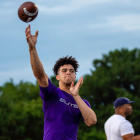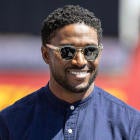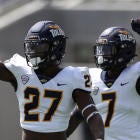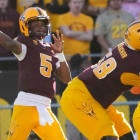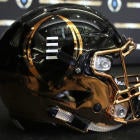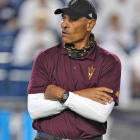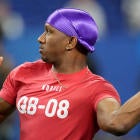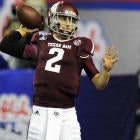It wasn't just coincidence to Bobby Burton. The 47-year-old Houston native had been covering college football recruiting for more than 20 years. With increased frequency, the best players he saw were more Americanized than American.
Burton lives in a Houston recruiting hotbed, but what he increasingly saw created a recruiting quandary. Who were these kids with the strange names? They were polite, dedicated and often studs.
They absolutely were Nigerian, or the second-generation offspring of Nigerians, playing the hell out of American football.
"You're always looking for the next thing in recruiting," said Burton, a writer for 247Sports.
This one hit him between the eyes.
All of it made sense when Burton did the math. Nigeria is the seventh most populous nation in the world (190 million). There are more Nigerian immigrants in the United States (376,000) than anywhere in the world. The Houston metro area is home to most Nigerians in the country (about 150,000).
Somehow their culture, their drive, their family structure and, oh yes, their bodies seemed to fit football.
With some meticulous research, Burton determined that in the 2016 NFL Draft there were as many players taken from Lagos, Nigeria, as from the city of Chicago (three).
"Unbelievable, unbelievable," said Hakeem Olajuwon, the acknowledged pied piper for Nigerian athletes after coming out the University of Houston in 1984 and becoming a member of the Naismith Memorial Basketball Hall of Fame.
"You can see the talents coming out."
It turns out, this phenomenon was bound to happen.
"I think it was kind of that moment in time," Burton said. "It's gone past the point of coincidence … It's no longer just [an] anomaly. It's part of the fabric of football and football recruiting in this country."
Their story goes beyond college football -- or even college athletics. Forget any athletic stereotype, Nigerians have a fierce family pride and dogged belief in education -- particularly higher education -- that allows them to succeed in this country.
These noble West African natives and their descendants are the American Dream.
"There is an honor about them," USC coach Clay Helton said.
Helton counts at least five first- or second-generation Nigerians on his roster.
"They're such a regal people," said Chris Plonsky, the women's athletic director at Texas.
Oh, and they can play. In the space of four picks at the end of the first round and beginning of the second of that 2016 NFL Draft, three were of Nigerian descent (Ole Miss' Robert Nkemdiche, Texas A&M's Germain Ifedi and Oklahoma State's Emmanuel Ogbah).
While the NCAA doesn't keep statistics on nationality (only race), Nigerian influence on college sports is obvious. Among the Power Five, only the SEC didn't have at least one player of Nigerian heritage on its all-conference first or second teams in 2016.
The past three seasons, at least one player of Nigerian heritage has finished in the top 25 nationally in tackles.
At least 80 players of Nigerian ancestry have populated professional football, soccer, basketball and even car racing in recent years. In 1987, Christian Okoye ("The Nigerian Nightmare") became the first Nigerian-born NFL player.
Before Okoye, Olajuwon was the inspiration.
"You're totally right," said Emmanuel Acho, a Nigerian-American who played linebacker at Texas and in the NFL. "If you want to start with Hakeem Olajuwon or you want to start with Christian Okoye, [it doesn't matter]."
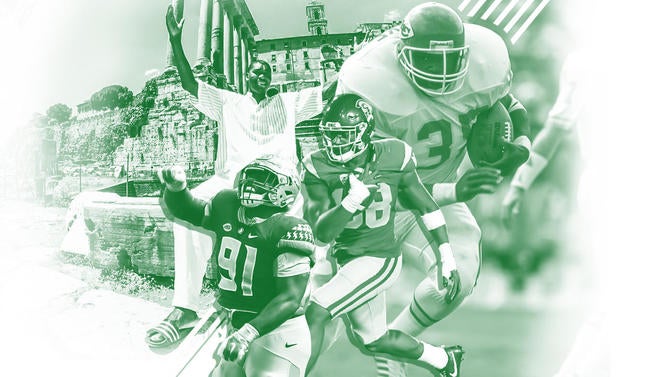
Hakeem's background in soccer and handball helped his footwork in basketball. Those Phi Slama Jama teams in the mid-1980s changed the game.
But what about the scores of second-generation Nigerians -- those born into a family with at least one Nigerian-born parent? In the 2016 NFL Draft alone, there were three times as many Nigerian players with hereditary ties to the country's dominant tribe -- the Igbo -- (six) than draftees from Florida State (two).
Oluwole Betiku might be the next Nigerian phenom in the NFL. The sophomore linebacker is already the talk of Southern California, where they affectionately they call him "Wole" (woe-lay).
Betiku was discovered at a basketball camp in Nigeria. At age 15, he rode 11 hours in a bus to that camp in hopes of finding a better life for his impoverished family.
Desperation doesn't begin to describe it. Seventy percent of the Nigerian population is below the poverty line. Forty percent of the population is illiterate. The AIDS rate there is the highest in the world.
"We have oil everywhere," Sonny Acho said of his native land.
Acho is father of Sam and another Texas/NFL linebacker, Emmanuel. Sonny has become an icon not only in his Dallas community but also for his Nigerian outreach.
"We have a corrupt culture: Get all you can!" he said of Nigeria. "Only a few politicians live large. Millions live in poverty. These are the people that we are trying to go help."
Sam and Emmanuel have been on an estimated 15-20 mission trips back to their parents' homeland. They have recruited friends and teammates to provide basic needs to villages.
"People talk about modern-day miracles," Sam explained. "I saw a lady that was blind, and she received her sight through prayer."
That required some reconfirmation. The mission trip did include some doctors who were removing cataracts. Wasn't that what Sam witnessed?
"She starts praying, praying, praying," Sam said. "The next thing she says is, 'Amen.' I'm standing around the way just kind of seeing what's going on. The lady starts freaking out. They hold up this card and ask her what color it is.
"She says, 'Yellow.'"

A more conventional miracle: Out of that Nigerian camp, Betiku eventually got referred to former Penn State star LaVar Arrington, who became his legal guardian and brought him to the U.S. Betiku didn't take up football until he was a sophomore at Serra High School in Los Angeles.
At that point, he was so naïve to the sport, Wole shed his shoulder pads as an annoyance. Just getting on the field for the Trojans for five games as a freshman was a win.
"I'll never forget him absolutely breaking down into tears one day in our defensive team meeting," Helton said. "They had showed some tape on him and a little bit of praise. He said, 'Coach, if you could imagine where I was a couple of years ago to where I'm sitting right now. I just thank God for this opportunity.'"
If you want to secure one of these talents, you might want to place a call to Lou Ayeni. He is as plugged in to the Nigerian recruiting scene as anyone. Both parents of Iowa State's running backs coach are from Lagos, Nigeria's capital.
Babs and Flora have PhDs. Dad is a statistical engineer. Mom is a biomedical statistician. One sister, Tina, is a nationally noted oncologist who treated the mother of Iowa State coach Matt Campbell.
"She's trying to find a cure for ovarian cancer," Lou said. "My mom makes fun of me. You went to Northwestern to coach football? I don't understand it."
That was after playing tailback and safety for the Wildcats under Randy Walker and surviving eight surgeries in his career. That was after his mother all but hand-picked the elite school for her son.
"My mom says, 'You're going to the best academic school you can go to,'" Lou recalled. "I was high school player of the year in Minnesota. I was enamored with Wisconsin. My first Big Ten visit was Iowa. They were really intriguing schools to me."
Flora then interjected: Nothing is happening until you visit Northwestern.
"We go through the academic piece. First thing she says is, 'You're coming here,'" Lou said. "Some Nigerian families are like that."
As an Ayeni, Lou did take the road less traveled. He knows those Dallas and Houston hotbeds.
Running back Kene Nwangwu was the state high jump champion out of Dallas, not the kind of player who come to Ames, Iowa. He was offered by every Big 12 school. Iowa State got him.
"It was an easy sell for me," Ayeni said. "His family is very similar to my family -- 4.0 GPA, yes sir, no sir."
Ayeni says he can see Nigerian talent just by watching tape.
"Some of them," he said. "If I hear the name and watch them, I'll know if they're Nigerian."
Their names are often lyrical, peaceful and meant to convey both their faith and future -- Blessing, Sunday, Passionate, Peace, Promise, Princess.
Former Iowa State offensive lineman Oni Omoile was part of a royal bloodline in Nigeria. His nickname on the team quickly became "Prince."
"We know each other by our last names," Sonny Acho said. "You give me somebody's last name, not only will I know that person is from Nigeria, I will even tell you where the person is from. It tells you the tribe and the language the person speaks."
"Acho" means "I have found what I'm looking for," according to Sonny. Burton says he knows Nigerians by another definition.
"I've been doing this a long time," he said. "I can't remember a Nigerian kid ever having grade problems. It's not the physical nature of their ability. It's the maximization of what they have."

There are other cultures that stress education and family. Why are Nigerians different to be the subject of this talent/recruiting boom?
The Immigration and Nationality Act of 1965 was a direct result of the growing civil rights movement. It relaxed immigration quotas. The Refugee Act of 1980 made it easier for African immigrants to come here. That was important for those fleeing conflict-impacted areas, such as Nigeria.
That Nigerian U.S. population of 376,000 is roughly the size of New Orleans. That sample size has produced an athletic revolution.
WNBA players Chiney and Nneke Ogwumike -- from the Houston suburb of Tomball -- were the only other siblings besides the Mannings to be drafted No. 1 overall in a U.S. professional sports league (2012, '14).
They are part of the fabric of a metro area. Half of all African immigrants in Houston are from Nigeria
"Why is there such a concentration in Houston?" asked Stephen Klineberg, a sociology professor at Rice. "It's the classic story of immigration. You go where you know people. You go there because your cousin is there."
And the climate is roughly the same. The humidity and warmth of Houston is similar to Lagos. That gives rise to the some of the first families of Nigerian-American sports -- the Achos, the Orakpos, the Okafors.
All-American linebacker Brian Orakpo came out of Houston to win a national championship at Texas. He has been selected for the Pro Bowl in half of his eight pro seasons.
Emeka Okafor was the first member of his Nigerian family born in the United States. The former UConn basketball star and No. 2 overall draft pick played 10 NBA seasons. Distant cousin Jahlil Okafor was the No. 3 pick overall in 2015 out of Duke.
The Nigerian surge in athletics is best described another way: Half of all Nigerians have arrived in the country since 2000. Twenty-nine percent of those immigrants age 25 or older hold a master's degree. That's compared to 11 percent of the overall U.S. population. Eight percent of those Nigerians hold doctorate degrees compared to 1 percent of the U.S. population. This 2008 story calls them the most educated ethnicity in the U.S.
The NCAA's antiquated bylaws constantly remind us a degree doesn't necessarily equal an education. But in the Nigerian culture, education is the foundation for life.
Sam Acho could have played anywhere. His athletic talent was evident. But he was also being recruited by elite schools including several in the Ivy League. Sonny had to be convinced Texas was worthy of his son.
"Sam got into Texas' McCombs School of Business," Sonny said. "That solved the problem. Mack Brown basically knew we were strong people. Anything outside of that was going to cause a problem. They allowed us to be involved in the boy's lives. It's all about academics first and football second."
In 2010, Sam won the Campbell Trophy, the so-called "Academic Heisman" for the nation's top football scholar-athlete. Sam has a master's in international business. Emmanuel has a master's in psychology.
As kids, they led somewhat of a cloistered life. Such is the influence of parents. Sonny said former USC coach Pete Carroll once pulled Sam from a group of 300 and tried to get him to commit.
So you can sort of understand a natural skepticism.
"My kids couldn't do sleepovers," Sonny said. "I don't know what you have going on in your house. … I'm not willing to let my son go over there and something goes wrong and then they accuse my son of raping … many African parents will be like that."
A large part of this story is simple math and demographics. Nearly 16 percent of the United States' population has ties to Africa, and nearly five percent of its immigrant population is from Nigeria. The only countries in the world larger than Nigeria are Pakistan, Brazil, Indonesia, the United States, India and China. According to a new United Nations report, Nigeria will be the third-most populous country in the world by 2050, overtaking the United States.
There are more native Nigerians in the U.S. than from any other African nation. In 1980, that number was 25,000. As the refugee laws began to loosen, in every decade from the 1980s through the 2000s, at least 10 million immigrants came to the U.S.
Eighty-eight percent of those were of Asian, Latin American, Caribbean or African descent, Klineberg said.
"It's a new immigration stream that has never existed before in American history," he added.
Nigerian families tend to be large, accomplished and -- as mentioned -- extremely close. Florida State All-ACC defensive tackle Derrick Nnadi says he talks to each of his six siblings daily via social media.
"Every day we have a whole group chat," he said.
A brother, Bradley, is an actor in Southern California. A sister, Ashley, got into the nursing program at Old Dominion. Derrick somehow ended up the kid with his hand in the dirt -- although one with a 3.12 grade-point average last semester.
"I have four jobs," Derrick said. "Go to class, study, get conditioned, play football. That really boils down to two jobs."
You shouldn't even have to ask. Consider his father, Fred Nnadi. He came to the U.S. with his brother decades ago determined to carve out a life as an engineer.
But like a lot of immigrants, he was hindered by his nationality and the language barrier.
"I went to a job interview one time. I had three degrees going in," Fred said. "I applied to be a meter reader. The supervisor doesn't have the degree I have.
"He hired me and didn't say a word. When I left, he started tell me … he wished he had the education I had. I had to feed my family. That's why we emphasize education."
But perhaps the only reason Derrick is at Florida State in the first place is that Fred survived the brutal Nigerian civil war from 1967-70.
Up to two million might have died in the bloody conflict. It evolved as Nigeria was finding its identity as an independent nation after separating from the United Kingdom in 1960.
As a teenager, Fred voluntarily joined what he said were the equivalent of U.S. Army Rangers, fighting behind enemy lines. This was in the days of governmental conscription.
"It was a war of genocide … It was a terrible war," Fred said. "That war, they have not recovered. I'm not kidding you. I don't care what anybody says."
Those who survived at least had the chance to pass on their genes in the United States. Fred's father had been a tribal chief back in the homeland with "many wives" who "when he walked on land, the ground shook."
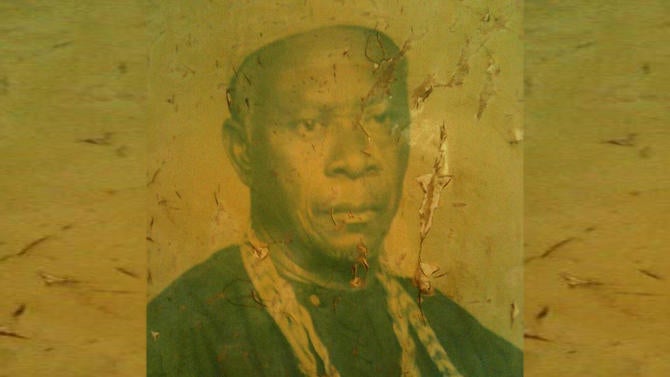
"I have so many brothers and sisters," Fred said. "We were in the hundreds. He was a very great man. I have to tell you, when you look at Derrick, he's black and big. … You're looking at my father."
That memory of Chief Ezeoha explains some of the why the 6-foot-1, 312-pound Derrick became one of three "Seminole Warriors" on the team by throwing up 525 pounds on the bench.
"I have a video if you want to see it," Derrick said proudly. "I will never shy from showing the video."
After that civil war, a series of oppressive dictators emerged. Lately, the ISIS-affiliated Boko Haram has terrorized Nigerians.
Like all Nigerian athletes spoken to for this story, they seem to be Americans first. Some have been back to the homeland. All of them can't forget it.
"Killing this goat right in front of us and slicing it's neck," USC tight end Daniel Imatorbhebhe said while recalling a visit from his childhood. "[I remember] it running it around. We ate it later in the day. It was spicy."
In one sense, Imatorbhebhe is as American as the corner McDonald's. He was born in Nigeria but grew up in suburban Atlanta before signing with Florida and immediately transferring to USC.
Imatorbhebhe's mother is a biomedical consultant. His father worked for a mortgage company before the financial crash. His brother, Josh, is a Trojans receiver.
"It's tough because it's like we're not really seen as in the some mold as an African-American kid," Daniel said. "Teammates have always said, 'Y'all are just built different. What do you attribute that to? Is it what you eat?'"
Yes, if you consider Nigerian staples oxtail, coconut rice and fufu the diet of champions. The family is also Yoruba, another common tribe in Nigeria.
"We'll speak Pidjin [English] sometimes when we don't want people to know what we're saying," Daniel said.
Six years ago, Moralake Akinosun was a promising teenage sprinter from Chicago. One day the Nigerian native randomly tweeted the hopes and dreams of a 16-year-old girl: Graduate from college, go to the Olympics and win a gold medal. She accomplished all three.
The gold medal sprinter at the 2016 Rio Olympics recalled her days on the Texas track team.
"It's known that track and field is full of African-Americans," Akinosun said. "There are more Nigerians than there are black people. There were 15 or 20 [Nigerian track athletes at Texas]. There were more of us."
Her point: Not everyone in America makes the distinction between the two.
"Africans don't consider themselves black, they consider themselves Africans," said noted author Jon Entine, who is also executive director of the Genetic Literacy Project.
"American blacks can call themselves African-Americans, but they really are Americans. It's a whole different mindset in cultural history and tradition and pride [from Nigerians]."
Despite being born in Nigeria, Akinosun chose to compete for the United States, where she has spent the majority of her life.
"I've always competed for the U.S.," she said. "I am proud to be Nigerian. I've lived here for as long as I can remember. It's easier for me since I'm here.
"[But] I absolutely love being Nigerian. It is a culture that is so deep-rooted. There is a sense of welcoming and belonging when you meet Nigerians."
Entine has concluded those with a West African ancestry have -- in general -- less body fat, proportionally more lean muscle mass and a higher percentage of fast-twitch muscles.
If this begins to walk a thin line of racial stereotyping, consider the Twitter handle of Akinosun: @MsFastTwitch.
"We're mostly fast-twitch [muscle] fibers," she said. "There has to be something a lot of Nigerian athletes have in common. There is something beyond our extreme work ethic. There has to be some genetic factor.
Olajuwon was an impact 7-footer who thrived on that aforementioned diet.
"I think the genes and the God-given talent," he said. "… The intelligence, the culture, the diversity. There are a lot of factors that play together."
Ayeni, that man who knows the pipeline, agrees.
"First of all, the thing about Nigerians is they have distinguishing traits," he said. "They have fast-twitch muscles. They're very chiseled, very tough. It's the same thing when you think of the Polynesian culture. You think of big, strong, thick torsos."
Again, why? Other cultures stress education. Other cultures stress family. Other cultures are strong and driven.
"There are a billion people in India," Tina Ayeni said. "When I watch the Olympics … I'll have friends who are from India, I'll joke, 'Where is your team?'
"Routinely they'll say sports is not something that is promoted in the culture. In Nigeria it is."
Soccer is the country's national sport. Olajuwon opened the door for basketball. In 2012, Nigeria was the only African nation to qualify for the Summer Olympics through the FIBA qualifying tournament.
Few know the Milwaukee Bucks' "Greek Freak" Giannis Antetokounmpo has Nigerian parents.
But ancestry is not necessarily destiny.
"What is it about people's ancestry about how they succeed in sports?" Tina Ayeni asked. "Different populations have people who have potential. But that potential needs to be cultivated."













